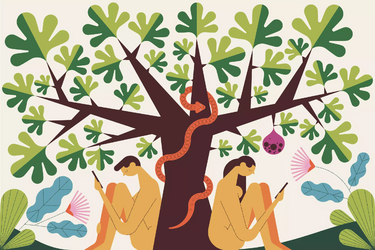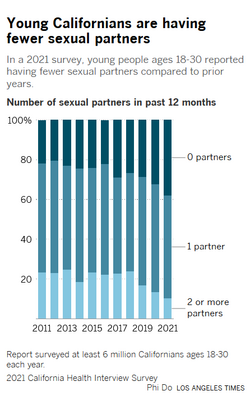
(Patrick Hruby / Los Angeles Times)
Vivian Rhodes figured she would eventually have sex.
She was raised in a Christian household in Washington state and thought sex before marriage would be the ultimate rebellion. But then college came and went — and no sex. Even flirting “felt unnatural,” she said.
In her early 20s, she watched someone she followed on Tumblr come out as asexual and realized that’s how she felt: She had yet to develop romantic feelings for anyone, and the physical act of sex just didn’t sound appealing.
“Some people assume this is about shaming other people, and it’s not,” said Rhodes, 28, who works as a certified nursing assistant in Los Angeles. “I’m glad people have fun with it and it works for them. But I think sex is kind of gross. It seems very messy, and it’s vulnerable in a way that I think would be very uncomfortable.”
For what researchers say is an array of reasons — including technology, heavy academic schedules and an overall slower-motion process of growing up — millennials and now Gen Zers are having less sex, with fewer partners, than their parents’ and grandparents’ generations did. The social isolation and transmission scares of the COVID-19 pandemic have no doubt played a role in the shift. But researchers say that’s not the whole story: The “no rush for sex” trend predates the pandemic, according to a solid body of research.
UCLA has been tracking behavioral trends for years through its annual California Health Interview Survey, the largest state health survey in the nation. It includes questions about sexual activity. In 2021, the survey found, the number of young Californians ages 18 to 30 who reported having no sexual partners in the prior year reached a decade high of 38%. In 2011, 22% of young people reported having no sexual partners during the prior year, and the percentage climbed fairly steadily as the decade progressed.
California adults ages 35 to 50 who participated in UCLA’s 2021 survey also registered an increase in abstinence from 2011 to 2021. But with the percentage of “no sex” respondents rising from 9% to 14% during that time frame, the increase was not as pronounced.

The University of Chicago’s General Social Survey — which has been following shifts in Americans’ behavioral trends for decades — found that 3 in 10 Generation Z males, ages 18 to 25, surveyed in 2021 reported having gone without sex the prior year. One in four Gen Z women also reported having had no sex the prior year, according to Jean Twenge, a San Diego State University psychology professor who reviewed the data for her book “Generations.”
In an age where hook-ups might seem as unlimited as a right swipe on a dating app, it’s easy to assume that Gen Z “should be having the time of their lives sexually,” Twenge said.
But that’s not how it’s playing out. Twenge said the decline has been underway for roughly two decades.
She attributed the slowdown in sexual relations most significantly to what she calls the “slow-life factor.” Young people just aren’t growing up as fast as they once did. They’re delaying big milestones such as getting their driver’s licenses and going to college. And they’re living at home with their parents a lot longer.
“In times and places where people live longer and education takes longer, the whole developmental trajectory slows down,” she said. “And so for teens and young adults, one place that you’re going to notice that is in terms of dating and romantic relationships and sexuality.”
A slight majority of 18- to 30-year-olds — about 52% — reported having one sexual partner in 2021, a decrease from 2020, according to the UCLA survey. The proportion of young adults who reported having two or more sexual partners also declined, from 23% in 2011 to 10% in 2021.
 '
'Though sex was on the decline in the years leading into the pandemic, COVID-19 made dating trickier.
Many people tightened their social circles when the pandemic surged in 2020 and 2021. And young people’s reliance on cellphones and apps for their social interactions only intensified when in-person meet-ups posed a risk of serious illness.
In general, people coming of age in an era of dating apps say the notion of starting a relationship with someone they meet in person — say a chance encounter at a bar or dance club — seems like a piece of nostalgia. Even friendships are increasingly forged over texting and video chats.
“A lot of young people when you talk to them will say their best friends are people they’ve never met,” said Jessica Borelli, a professor of psychological science at UC Irvine. “Sometimes they live across the country or in other countries, and yet they have these very intimate relationships with them. … The in-person interface is not nearly as essential for the development of intimacy as it might be for older people.”
Ivanna Zuniga, 22, who recently graduated from UC Irvine with a degree in psychological sciences, said her peers have largely delayed sex and romance to focus on education and career. Zuniga, who is bisexual, has been with her partner for about four years. But their sex life is sporadic, she said, adding that they hadn’t been intimate in the month leading up to her graduation.
“I’ve been really preoccupied with my studies, and I’m always stressed because of all the things I have going on,” she said. “My libido is always shot, and I don’t really ever think about sex.”
The sexless phenomenon has made its way into pop culture. Gone are the days when meet-cutes in bars leading to one-night stands and sex at college parties were the cornerstone of coupling in films.
In “No Hard Feelings,” released this year, a 32-year-old woman is hired by “helicopter parents” to deflower their shy 19-year-old son. At a party, the woman frantically searching for her date busts open bedroom doors where she expects to find people feverishly tangled in sheets. Instead, she finds teens sitting side by side on a bed, fully clothed, scrolling their phones or playing virtual reality games. Bemused, she yells, “Doesn’t anyone f— anymore?”
While there are practical benefits to waiting to be in a physical relationship, including less risk of sexually transmitted diseases and unplanned pregnancy, Twenge argued that there are also downsides to young people eschewing sex and, more broadly, intimacy. Unhappiness and depression are at all-time highs among young adults, trend lines Twenge ties to the rise of smartphones and social media. And she noted with concern the steady decline in the birth rate.
“It creates the question of whether Social Security can survive,” Twenge said. “Will there be enough young workers to support older people in the system? Will there be enough young workers to take care of older people in nursing homes and in assisted-care facilities?”
Zuniga, who plans to pursue a doctorate in clinical psychology, can’t imagine pausing her education or career to have children, so safe sex is particularly important, she said. Others interviewed said “horror stories” involving friends who contracted herpes or other sexually transmitted infections had turned them off from casual sex.
“I prioritize my studies too much, and I can’t fathom the thought of having my identity as an academic fall secondary to being a mother,” Zuniga said. “Moving out of the income bracket that you’re born into is so hard to do, and a very secure way to do it is through education.”
For Rhodes, not having sex has taken a lot of the pressure off social interactions.
“It lets me relax,” she said. “It’s not that I don’t care about how I look or how I come off to other people. But I have a little extra help caring less about it, because I don’t have to worry about attracting specific kinds of people for specific things.”
And she pushes back against the notion that shying away from sex is some sort of societal problem that needs to be “fixed.” It might even be a sign that young people have more control of their bodies and desires, she said.
“Maybe you don’t have to have sex all the time,” Rhodes said. “Maybe if you’re doing other things in your life, and you’ve got other priorities, or you just don’t feel like it, that can be a good enough answer.”
Article Link
Archive

